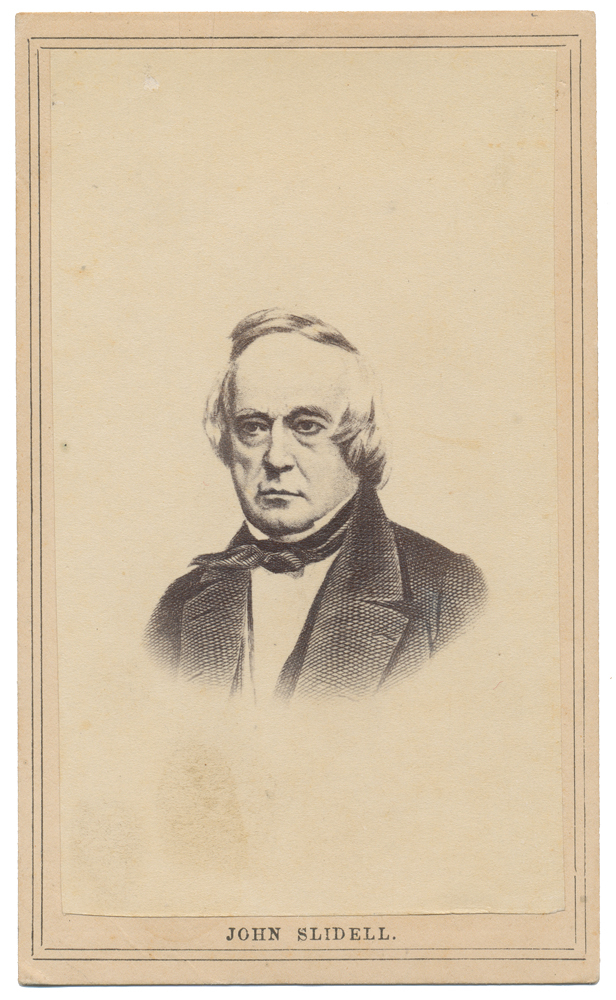site search
online catalog
CDV OF LOUISIANA CONGRESSMAN JOHN SLIDELL, "TRENT AFFAIR"

Hover to zoom
$40.00
Quantity Available: 1
Item Code: 1138-1587
Shipping: Determined by Method & Location of buyer
To Order:
Call 717-334-0347,
Fax 717-334-5016, or E-mail
This image is an engraving showing a bust view of Slidell. Image is clear with very good contrast. Nice mount with printed name below the image. No photographer's backmark.
John Slidell (1793 – July 9, 1871) was an American politician, lawyer, and businessman. A native of New York, Slidell moved to Louisiana as a young man and became a Representative and Senator. He was one of two Confederate diplomats captured by the United States Navy from the British ship RMS Trent in 1861 and later released.
With the passage of the Louisiana ordinance of secession, Slidell resigned from the Senate and headed home. In a dramatic farewell address, he threatened the boycott of all northern manufacturing and predicted the dominance of southern ships on the seas. He argued that foreign countries would prevent the Union from blockading southern ports: he promised that the Confederate States would never fire the first shot but if the Union did so, "This will be war, ... and we shall meet it with ... efficient weapons."
Slidell soon accepted a diplomatic appointment to represent the Confederacy in France. Slidell was one of the two Confederate diplomats involved in the Trent Affair in November 1861. After he was appointed the Confederate commissioner to France in September, 1861, he ran the blockade from Charleston, South Carolina, with James Murray Mason of Virginia. They then set sail from Havana on the British mail boat steamer RMS Trent but were intercepted by the US Navy while en route and taken into captivity at Fort Warren in Boston.
The Northern public erupted with a huge display of triumphalism at this dramatic capture. Even the cool-headed Lincoln was swept along in the celebratory spirit, but when he and his cabinet studied the likely consequences of a war with Britain, their enthusiasm waned. After some careful diplomatic exchanges, they admitted that the capture had been conducted contrary to maritime law and that private citizens could not be classified as "enemy dispatches." Slidell and Mason were released, and war with England was averted.
After the resolution of the Trent Affair, the two diplomats set sail for England on January 1, 1862. From England, Slidell at once went to Paris, where, in February 1862, he paid his first visit to the French minister of foreign affairs. His mission to gain recognition of the Confederate States by France failed, as did his effort to negotiate a commercial agreement for France to get control of Southern cotton if the blockade were broken. He succeeded in negotiating a loan of $15,000,000 from Emile Erlanger & Co. and in securing the ship "Stonewall" for the Confederate government.
Slidell moved to Paris, France, after the Civil War. He died in Cowes, Isle of Wight, England, at age 78. He is interred in the Saint-Roman family private cemetery near Paris.
This image was from the collection of the late William A. Turner. [jet] [ph:L]
~~~~~~~~~~~~~~~~~~~~~~~~~~~~~~~~~~~
THIS ITEM, AS WITH ALL OTHER ITEMS AVAILABLE ON OUR WEB SITE,
MAY BE PURCHASED THROUGH OUR LAYAWAY PROGRAM.
CLICK HERE FOR OUR POLICIES AND TERMS.
THANK YOU!
Inquire About CDV OF LOUISIANA CONGRESSMAN JOHN SLIDELL, "TRENT AFFAIR"
Most Popular
Historical Firearms Stolen From The National Civil War Museum In Harrisburg, Pa »
Theft From Gravesite Of Gen. John Reynolds »
Selection Of Unframed Prints By Don Troiani »
Fine Condition Brass Infantry Bugle Insignia »
featured item
RARE AMES MODEL 1847 SAPPERS & MINERS ARTILLERY MUSKETOON SWORD BAYONET-DATED 1847
These well-made sword bayonets were produced from 1847 through 1856 for the Springfield Model 1847 Sappers & Miners musketoon, of which only 830 total arms were manufactured. The bayonet is from the second contract of 300, as it does not have… (490-7261). Learn More »


